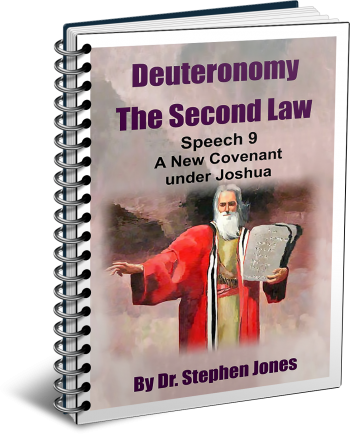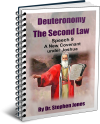Latest Posts
View the latest posts in an easy-to-read list format, with filtering options.

A commentary on the ninth speech of Moses in Deuteronomy 29-31. The book of Deuteronomy is a series of 12 speeches that Moses gave just before his death at the end of Israel's wilderness journey.
Category - Bible Commentaries

Some Bibles, such as The Jerusalem Bible, put Deut. 29:1 as the final verse of the previous chapter, making it Deut. 28:69. It is actually a scribal introduction from Eleazar to the New Covenant solution being presented in Deuteronomy 29. This scribal introduction reads:
1 These are the words of the covenant which the Lord commanded Moses to make with the sons of Israel in the land of Moab, besides the covenant which He had made with them at Horeb. 2 And Moses summoned all Israel and said to them…
Eleazar tells us that this is a second covenant besides the first that was given forty years earlier at Horeb in Exodus 20. As such, these two covenants foreshadow the Old and New Covenants, each with its own law. The first covenant was given through Moses, while the second transferred authority to Joshua, the type of Jesus Christ. This second covenant correlates directly with the “second law,” which is the meaning of the book’s Greek name, Deuteronomy.
Those who make this second covenant to be the climax of the laws of tribulation in Deuteronomy 28 do not understand that this second covenant is the promise of the New Covenant. The curses of the law in chapter 28 prophesy of the final result of the Old Covenant’s failure. The New Covenant in chapter 29 shows that God’s oath is the solution.
The laws given in Exodus and Leviticus are essentially the same as those given in Deuteronomy, though restated in some different ways and clarified occasionally. Hence also we see the same prophetic pattern in Exodus 34, after the first law was broken, for the second set of laws were “like the former ones.” Exodus 34:1 reads,
1 Now the Lord said to Moses, “Cut out for yourself two stone tablets like the former ones, and I will write on the tablets the words that were on the former tablets which you shattered.”
This prophesied how the law was broken under the Old Covenant, but that the same law was instituted under the New Covenant without being broken. The Old Covenant gave us commandments which men could not keep, though they vowed obedience. The New Covenant gave us the same words of the law, but this time God obligated Himself to write them in our hearts by His Spirit. The laws were thus changed from commandments to promises. Hence, when the Commandments spoke, “You shall not,” they prophesied into our lives that by following Joshua (Yeshua) we would not commit these sins.
The manner in which God would accomplish this was unclear under Moses, but when we read the writings of Paul and John, we discover the secret. The Holy Spirit begets Christ in us by the gospel, and that holy seed cannot sin because it is begotten of God (1 John 3:9, literal). Though the “old man,” begotten of Adamic flesh, continues to fight against the Spirit (Rom. 7:25), the New Creation Man cannot sin, because his Father is God.
A full study of this can be found in my commentary on Paul’s Epistle to the Saints in Rome, Vol. 1, chapter 10.
In reading the book of Deuteronomy, we can understand it only if we view it as a prophecy of the New Covenant under Christ. Most have not viewed it in this way, because they think the law is incompatible with the New Covenant’s grace. Yet when we understand that the covenants are two distinct paths toward salvation—one being impossible, and the other being the only way to succeed—it is apparent how the same law of God is applicable in each case.
The necessary changes in the forms of the law are discussed more fully in the book of Hebrews.
Another important insight into the two laws and the two covenants can be seen here as well. The Exodus covenant at Horeb was given at the start of Israel’s wilderness journey. The Deuteronomy covenant was given in the plains of Moab at the end of the forty years in the wilderness. Acts 7:38 speaks of Israel as being “the church in the wilderness.”
Just as there was a “church” (Hebrew: kahal, “congregation, assembly”) under Moses and Joshua, so also has there been a “church” (Greek: ekklesia) under Jesus Christ. The New Testament church has wandered in its own wilderness for 40 Jubilee cycles (40 x 49 years). Even as Moses led Israel out of the house of bondage, Jesus led the church out of the bondage to sin by His death on the cross as the Passover Lamb. Seven weeks after His resurrection, the Covenant was given in the upper room when the Spirit was poured out.
This was like the Exodus covenant at Horeb.
Forty Jubilees has passed since then, and we are now ready to be led into the Promised Land by Joshua the Ephraimite. Since we live at the end of the wilderness journey, the Deuteronomy law is most relevant to the divine plan today. Likewise, the second covenant, promised to Abraham, Moses, and the prophets, and ratified by the blood of Jesus on the cross, is now ready to be implemented.
In fact, this is my primary motivation in writing this commentary on Deuteronomy. Even as the first century believers were living in the early days of the church when Christ led us out of the house of bondage by His death as the Passover Lamb, so also today we have arrived in the plains of Moab and stand ready to enter the Kingdom through the second coming of Christ. In conjunction with this great event, we need to hear the second law in order to understand the laws of the coming Kingdom.